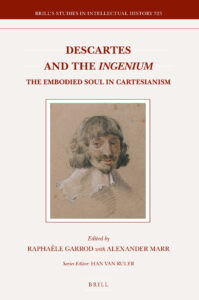
Edited by Raphaële Garrod (Oxford) and Alexander Marr (Cambridge), “Descartes and the Ingenium” tracks the significance of embodied thought (ingenium) in the philosophical trajectory of the founding father of dualism. The first part of the book defines the notion of ingenium in relation to core concepts of Descartes’s philosophy, such as memory and enumeration. It focuses on Descartes’s uses of this notion in methodical thinking, mathematics, and medicine. The studies in the second part place the Cartesian ingenium within preceding scholastic and humanist pedagogical and natural-philosophical traditions, and highlight its hitherto ignored social and political significance for Descartes himself as a member of the Republic of Letters. By embedding Descartes’ notion of ingenium in contemporaneous medical, pedagogical, but also social and literary discourses, this volume outlines the fundamentally anthropological and ethical underpinnings of Descartes’s revolutionary epistemology.